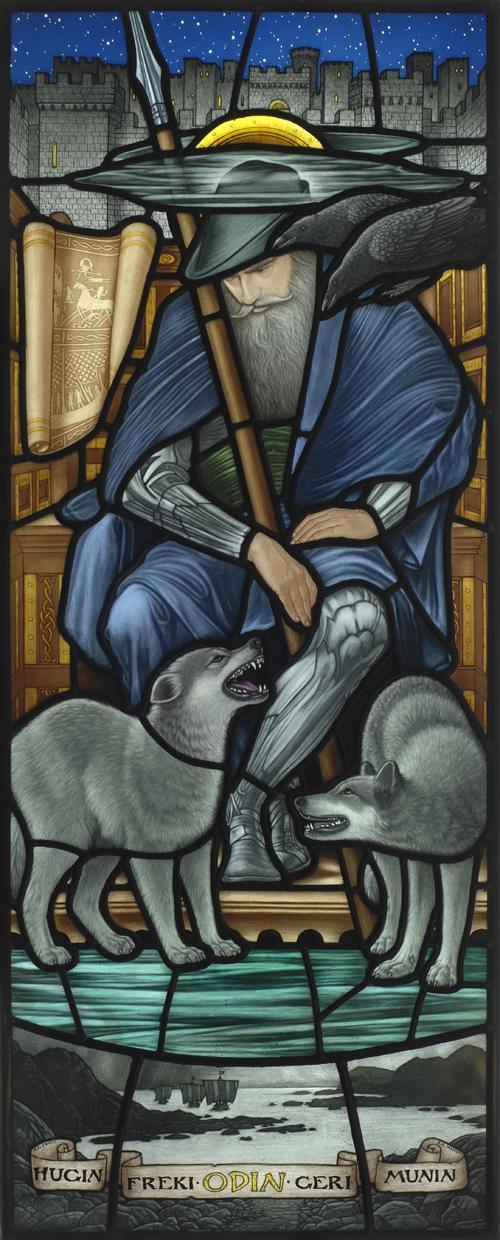Who is Wotan?
Who is Wotan?
In my previous article, I discussed what the Runes were, as well as giving both mythical and historical origins for them. In the former, I mentioned that they were discovered by Wotan in a nine-day and nine-night ordeal, but just who exactly is Wotan? In this piece I will be exploring the mythic folk patriarch, who is not only an evocative figure of European mythos, but also representative of something more, which is only implied in the attributed stories.
Wotan is, according to myth, the Allfather and lord of the place of the gods known as “Asgard”. He often described as a god of wisdom and magic, and it is he who discovered the Runes. He is also given the attributes of war, poetry, death. He has many names, which are far too numerous to list here, but they describe both his personality and his appearance, as a gaunt, red-haired fellow with morbid inclinations and a touch of madness about him, intense and flinty-eyed. He frequently wears a cloak and a broad hat, and carries a spear called “Gungnir” or “Swaying One”. Accompanying him are the two ravens Hugin and Munin, and the two wolves Freki and Geri. Wotan is the son of the human male Borr and the Jotuness – female frost giant – Bestla, and he has fathered many sons himself, some by his wife Frigg, and others by more amusing/terrifying partners such as the Jotuness Jord. His exploits are many and varied, from the aforementioned discovery of the runes, to plucking his own right eye out in exchange for wisdom, to being the ancestor/founder of royalty, to his prophecised leading of the Einherjar – those warriors he has chosen from the dead – in a final apocalyptic battle called Ragnarok.
It has been difficult to find an exact historical point of origin for Wotan, with the Romans around the first century likening him to Mercury – albeit with distinct differences beyond their fixation on communication – after observing the rites of Germanic tribes. Much lore than exists is from a Christian perspective, written long after the period of Wotan’s dominance, as monks and scholars merely recount the fragments of legends from a bygone age. Given that several of Wotan’s names refer to him as an ancestral figure, the idea that he is based on a very real person from ancient history seems the most likely, with the name “Spjalli Gauta” referring to him as “friend of the Goths” thus placing him around the same time period, if not earlier. While it is but a pet theory of mine, I do often wonder if perhaps these mythic cycles are in fact the dim recollection of times before recorded history, the accounts of Neolithic tribesmen repeated over generations until a wise leader becomes a god.
As with many mythic figures, Wotan is a halfway point between symbolism and the distant past, an encoded history concealed inside of allegory, and the insights of a given culture contained in such a way as to survive the passage of centuries, millennia even. For example, it has been noted by a few scholars that the ravens Hugin and Munin were never literal birds, but the concepts of thought and mind. Wotan would dismiss both, caring only that Mind returned, representing the act of meditation and dismissing noisy thoughts so that only pure mind was left. His Wolves, Geri and Freki, whose names translate to “ravenous”, were said to be well-fed, while Wotan himself drank only wine. Thus, his carnal, desirous aspects were satiated, but ultimately they were beneath him and apart, regarded as a separate entity and not Wotan himself.
It is my opinion that, given his deathly, occult associations, Wotan represents the archetypal sort who will get the most mileage out of esoteric practices – those who the astrologer will call “Plutonian”. Wotan represents the kind of individual who wanders into dark places and brings back the light of wisdom cultivated by experience. He is no stranger to his own flesh, nor to his own mind, and yet, he considers himself to be independent of these. That the god who preceded Wotan was a mythic chieftain, Tiw, was considered analogous to Mars/Aries, means that when taken into account with Wotan’s decidedly morbid, cerebral nature, Wotan finds himself in the domain of Pluto/Scorpio, which has to do with obsession, the taboo, death/rebirth, sex, and the occult. Those who aren’t afraid to explore uncomfortable subjects in pursuit of insight are as Wotan, and thus will be able to utilise esoteric practices to their fullest extent and yield the greatest returns in the form of practical results.
artwork - 1881 Sir Edward Cooley Burne-Jones
" Wotan was likely a wise leader of ancient Germanic tribes, whose influence was so profound that he became permanently implanted on the collective psyche of his people as myth."..Well, Odin was the leader of a Germanic tribe which came from the area around the Black Sea...taking his people all the way from those eastern regions, through central western Europe, all the way up to, what is known as Scandinavia is, by the standards from way back when, impossible, basically supernatural..therefore he had to be Tyr incarnate because only a god could have pulled that off..Not?!
There's a reason legends were written then, aye.
I tend to regard mythology as an allegorical history. Wotan was likely a wise leader of ancient Germanic tribes, whose influence was so profound that he became permanently implanted on the collective psyche of his people as myth.
Thanks for the article, it was interesting to read about Wotan. I cannot know for sure whether the Germanic gods existed, but the story of the creation of the world and the deeds of the gods, which was passed down from generation to generation, sounds amazing. I can imagine how amazing and dangerous the world was in those distant times.
